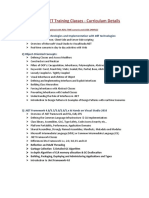0% found this document useful (0 votes)
15 views2 pagesMaster The Basics First (If Not Already) : Microsoft Learn For C# Basics
The document outlines a structured approach to mastering C# programming, starting from the basics and progressing to advanced concepts and the .NET ecosystem. It emphasizes hands-on practice through real projects and recommends specific resources for further study. Key topics include OOP principles, asynchronous programming, design patterns, and various frameworks like ASP.NET Core and Entity Framework Core.
Uploaded by
Mani KandanCopyright
© © All Rights Reserved
We take content rights seriously. If you suspect this is your content, claim it here.
Available Formats
Download as PDF, TXT or read online on Scribd
0% found this document useful (0 votes)
15 views2 pagesMaster The Basics First (If Not Already) : Microsoft Learn For C# Basics
The document outlines a structured approach to mastering C# programming, starting from the basics and progressing to advanced concepts and the .NET ecosystem. It emphasizes hands-on practice through real projects and recommends specific resources for further study. Key topics include OOP principles, asynchronous programming, design patterns, and various frameworks like ASP.NET Core and Entity Framework Core.
Uploaded by
Mani KandanCopyright
© © All Rights Reserved
We take content rights seriously. If you suspect this is your content, claim it here.
Available Formats
Download as PDF, TXT or read online on Scribd
/ 2
























































